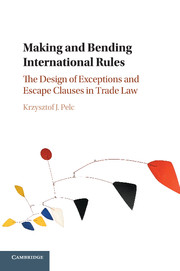Book contents
- Frontmatter
- Dedication
- Contents
- List of Tables
- Acknowledgments
- 1 The “Architectural Challenge” of International Rules
- 2 A Theory of the Design of Flexibility
- 3 A Brief Intellectual History of Flexibility in Law
- 4 The Twin GATT Exceptions: Fears and Solutions
- 5 The Evolving Design of Flexibility
- 6 The Bad News
- 7 The Good News
- 8 The Great Recession and Beyond
- Bibliography
- Index
7 - The Good News
Published online by Cambridge University Press: 05 September 2016
- Frontmatter
- Dedication
- Contents
- List of Tables
- Acknowledgments
- 1 The “Architectural Challenge” of International Rules
- 2 A Theory of the Design of Flexibility
- 3 A Brief Intellectual History of Flexibility in Law
- 4 The Twin GATT Exceptions: Fears and Solutions
- 5 The Evolving Design of Flexibility
- 6 The Bad News
- 7 The Good News
- 8 The Great Recession and Beyond
- Bibliography
- Index
Summary
The preceding chapter sounded the alarm. The existence of flexibility provisions may be the sine qua non of international treaties, yet in international trade, it comes at a significant and measurable cost. Countries turn to flexibility provisions with greater frequency as soon as they make more ambitious commitments, giving credence to the “law of constant protection.” And the mere availability of (unconstrained) flexibility increases unpredictability in a way that acts as a significant tax on trade. This may seem enough to cast doubt on the view of flexible contracts as an optimal second-best solution.
The picture, however, is not all bleak. The good news is summed up by one undeniable fact: despite the wide availability of flexibility measures policymakers have access to, the multilateral trade regime has not collapsed. The prediction that US $350 billion in world trade would be lost if countries were to spend all their binding overhang at once has not come to pass.1 Neither do countries seem to have especially abused safeguards, antidumping duties, and countervailing measures. And members have not started recurrently invoking the national security exception under Article XXI to defend protectionist policies, much as governments today would not think of openly invoking the rebus sic stantibus clause to break a treaty commitment.
What is more, countries have kept from abusing these flexibility options in the midst of the trade regime's greatest stress test, the 2008 economic downturn known as the Great Recession, and its long running repercussions, in the midst of which the world economy continues to wallow. Despite the spike in demand for protection that is usually thought to accompany hard times, leaders have exercised observable restraint, especially when compared against the excesses in trade policy during the Great Depression, starting with the Smoot Hawley Tariff of 1930. The task of this chapter is to disaggregate this good news into its components, and trace the root causes of each. How can we reconcile observable country behavior with what we know about members’ extensive menu of escape clause options? How is it that in the anarchic international setting, flexibility clauses that are formally unconstrained are not continually relied on, “thus vitiating the agreement”?
- Type
- Chapter
- Information
- Making and Bending International RulesThe Design of Exceptions and Escape Clauses in Trade Law, pp. 234 - 258Publisher: Cambridge University PressPrint publication year: 2016



